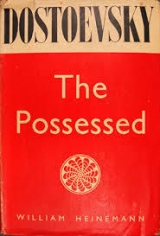
Текст книги "The Possessed"
Автор книги: Федор Достоевский
сообщить о нарушении
Текущая страница: 5 (всего у книги 49 страниц)
“In which you came off victor, however. Bismarck!”
“Without being a Bismarck I'm equal to falseness and stupidity wherever I meet it. falseness, and Praskovya's folly. I don't know when I've met such a flabby woman, and what's more her legs are swollen, and she's a good-natured simpleton, too. What can be more foolish than a good-natured simpleton?”
“A spiteful fool, ma bonne amie,a spiteful fool is still more foolish,” Stepan Trofimovitch protested magnanimously.
“You're right, perhaps. Do you remember Liza?”
“ Charmante enfant!”
“But she's not an enfantnow, but a woman, and a woman of character. She's a generous, passionate creature, and what I like about her, she stands up to that confiding fool, her mother. There was almost a row over that cousin.”
“Bah, and of course he's no relation of Lizaveta Nikolaevna's at all. . . . Has he designs on her?”
“You see, he's a young officer, not by any means talkative, modest in fact. I always want to be just. I fancy he is opposed to the intrigue himself, and isn't aiming at anything, and it was only the Von Lembke's tricks. He had a great respect for Nicolas. You understand, it all depends on Liza. But I left her on the best of terms with Nicolas, and he promised he would come to us in November. So it's only the Von Lembkev who is intriguing, and Praskovya is a blind woman. She suddenly tells me that all my suspicions are fancy. I told her to her face she was a fool. I am ready to repeat it at the day of judgment. And if it hadn't been for Nicolas begging me to leave it for a time, I wouldn't have come away without unmasking that false woman. She's been trying to ingratiate herself with Count K. through Nicolas. She wants to come between mother and son. But Liza's on our side, and I came to an understanding with Praskovya. Do you know that Karmazinov is a relation of hers?”
“What? A relation of Madame von Lembke?”
“Yes, of hers. Distant.”
“Karmazinov, the novelist?”
“Yes, the writer. Why does it surprise you? Of course he considers himself a great man. Stuck-up creature! She's coming here with him. Now she's making a fuss of him out there. She's got a notion of setting up a sort of literary society here. He's coming for a month, he wants to sell his last piece of property here. I very nearly met him in Switzerland, and was very anxious not to. Though I hope he will deign to recognise me. He wrote letters to me in the old days, he has been in my house. I should like you to dress better, Stepan Trofimovitch; you're growing more slovenly every day. . . . Oh, how you torment me! What are you reading now?”
“I ... I ...”
“I understand. The same as ever, friends and drinking, the club and cards, and the reputation of an atheist. I don't like that reputation, Stepan Trofimovitch; I don't care for you to be called an atheist, particularly now. I didn't care for it in old days, for it's all nothing but empty chatter. It must be said at last.”
“ Mais, ma chere...”
“Listen, Stepan Trofimovitch, of course I'm ignorant compared with you on all learned subjects, but as I was travelling here I thought a great deal about you. I've come to one conclusion.”
“What conclusion?”
“That you and I are not the wisest people in the world, but that there are people wiser than we are.”
“Witty and apt. If there are people wiser than we are, then there are people more right than we are, and we may be mistaken, you mean? Mais, ma bonne amie,granted that I may make a mistake, yet have I not the common, human, eternal, supreme [right of freedom of conscience? I have the right not to be bigoted or superstitious if I don't wish to, and for that I shall naturally be hated by certain persons to the end of time. El puis, comme on trouve toujours plus de moines que de raison,and as I thoroughly agree with that . . .”
“What, what did you say?”
“I said, on trouve, toujours plus de moines que de raison,and as I thoroughly . . .”
“I'm sure that's not your saying. You must have taken it from somewhere.”
“It was Pascal said that.”
“Just as I thought . . .it's not your own. Why don't you ever say anything like that yourself, so shortly and to the point, instead of dragging things out to such a length? That's much, better than what you said just now about administrative ardour. . .”
“ Ma foi, chere . . .why? In the first place probably because I'm not a Pascal after all, et puis . . .secondly, we Russians never can say anything in our own language. . . . We never have said anything hitherto, at any rate. . . .”
“H'm! That's not true, perhaps. Anyway, you'd better make a note of such phrases, and remember them, you know, in case you have to talk. . . . Ach, Stephan Trofimovitch. I have come to talk to you seriously, quite seriously.”
“ Chere, chere amie!”
“Now that all these Von Lembkes and Karmazinovs . . . Oh, my goodness, how you have deteriorated! . . . Oh, my goodness, how you do torment me! . . . I should have liked these people to feel a respect for you, for they're not worth your little finger – but the way you behave! . . . What will they see? What shall I have to show them? Instead of nobly standing as an example, keeping up the tradition of the past, you surround yourself with a wretched rabble, you have picked up impossible habits, you've grown feeble, you can't do without wine and cards, you read nothing but Paul de Kock, and write nothing, while all of them write; all your time's wasted in gossip. How can you bring yourself to be friends with a wretched creature like your inseparable Liputin?
“Why is he mineand inseparable 1” Stepan Trofimovitch Protested timidly.
“Where is he now?” Varvara Petrovna went on, sharply and sternly.
“He ... he has an infinite respect for you, and he's gone to S– k, to receive an inheritance left him by his mother.”
“He seems to do nothing but get money. And how's Shatov? Is he just the same?”
“ Irascible, mais bon,”
“I can't endure your Shatov. He's spiteful and he thinks too much of himself.”
“How is Darya Pavlovna?”
“You mean Dasha? What made you think of her?” Varvara Petrovna looked at him inquisitively. “She's quite well. I left her with the Drozdovs. I heard something about your son in Switzerland. Nothing good.”
“ Oh, c'est un histoire bien bete! Je vous attendais, ma bonne amie, pour vous raconter . ..”
“Enough, Stepan Trofimovitch. Leave me in peace. I'm worn out. We shall have time to talk to our heart's content, especially of what's unpleasant. You've begun to splutter when you laugh, it's a sign of senility! And what a strange way of laughing you've taken to! ... Good Heavens, what a lot of bad habits you've fallen into! Karmazinov won't come and see you! And people are only too glad to make the most of anything as it is. . . . You've betrayed yourself completely now. Well, come, that's enough, that's enough, I'm tired. You really might have mercy upon one!”
Stepan Trofimovitch “had mercy,” but he withdrew in great perturbation.
V
Our friend certainly had fallen into not a few bad habits, especially of late. He had obviously and rapidly deteriorated; and it was true that he had become slovenly. He drank more and had become more tearful and nervous; and had grown too impressionable on the artistic side. His face had acquired a strange facility for changing with extraordinary quickness, from the most solemn expression, for instance, to the most absurd, and even foolish. He could not endure solitude, and was always craving for amusement. One had always to repeat to him some gossip, some local anecdote, and every day a new one. If no; one came to see him for a long time he wandered disconsolately about the rooms, walked to the window, puckering up his lips, heaved deep sighs, and almost fell to whimpering at last. He was always full of forebodings, was afraid of something unexpected and inevitable; he had become timorous; he began to pay great attention to his dreams.
He spent all that day and evening in great depression, he sent for me, was very much agitated, talked a long while, gave me a long account of things, but all rather disconnected. Varvara Petrovna had known for a long time that he concealed nothing from me. It seemed to me at last that he was worried about something particular, and was perhaps unable to form a definite idea of it himself. As a rule when we met tete-a-teteand he began making long complaints to me, a bottle was almost always brought in after a little time, and things became much more comfortable. This time there was no wine, and he was evidently struggling all the while against the desire to send for it.
“And why is she always so cross?” he complained every minute, like a child. “Tows les hommes de genie et de progres en Mussie etaient, sont, et seront toujours desgamblers et desdrunkards qui boiventin outbreaks . . . and I'm not such a gambler after all, and I'm not such a drunkard. She reproaches me for not writing anything. Strange idea! . . . She asks why I lie down? She says I ought to stand, 'an example and reproach.' Mais, entre nous soit dit,what is a man to do who is destined to stand as a 'reproach,' if not to lie down? Does she understand that?”
And at last it became clear to me what was the chief particular trouble which was worrying him so persistently at this time. Many times that evening he went to the looking-glass, and stood a long while before it. At last he turned from the looking-glass to me, and with a sort of strange despair, said: “ Mon cher, je suis unbroken-down man.” Yes, certainly, up to that time, up to that very day there was one thing only of which he had always felt confident in spite of the “new views,” and of the “change in Varvara Petrovna's ideas,” that was, the conviction that still he had a fascination for her feminine heart, not simply as an exile or a celebrated man of learning, but as a handsome man. For twenty years this soothing and flattering opinion had been rooted in his mind, and perhaps of all his convictions this was the hardest to part with. Had he any presentiment that evening of the colossal ordeal which was preparing for him in the immediate future?
VI
I will now enter upon the description of that almost forgotten incident with which my story properly speaking begins.
At last at the very end of August the Drozdovs returned. Their arrival made a considerable sensation in local society, and took place shortly before their relation, our new governor's wife, made her long-expected appearance. But of all these interesting events I will speak later. For the present I will confine myself to saying that Praskovya Ivanovna brought Varvara Petrovna, who was expecting her so impatiently, a most perplexing problem: Nikolay had parted from them in July, and, meeting Count K. on the Rhine, had set off with him and his family for Petersburg. (N.B.– The Count's three daughters were all of marriageable age.)
“Lizaveta is so proud and obstinate that I could get nothing out of her,” Praskovya Ivanovna said in conclusion. “But I saw for myself that something had happened between her and Nikolay Vsyevolodovitch. I don't know the reasons, but I fancy, my dear Varvara Petrovna, that you will have to ask your Darya Pavlovna for them. To my thinking Liza was offended. I'm glad. I can tell you that I've brought you back your favourite at last and handed her over to you; it's a weight off my mind.”
These venomous words were uttered with remarkable irritability. It was evident that the “flabby” woman had prepared them and gloated beforehand over the effect they would produce. But Varvara Petrovna was not the woman to be disconcerted by sentimental effects and enigmas. She sternly demanded the most precise and satisfactory explanations. Praskovya Ivanovna immediately lowered her tone and even ended by dissolving into tears and expressions of the warmest friendship. This irritable but sentimental lady, like Stepan Trofimovitch, was for ever yearning for true friendship, and her chief complaint against her daughter Lizaveta Mkolaevna was just that “her daughter was not a friend to her.”
But from all her explanations and outpourings nothing certain could be gathered but that there actually had been some sort of quarrel between Liza and Nikolay, but of the nature of the quarrel Praskovya Ivanovna was obviously unable to form a definite idea. As for her imputations against Darya Pavlovna, she not only withdrew them completely in the end, but even particularly begged Varvara Petrovna to pay no attention to her words, because “they had been said in irritation.” In fact, it had all been left very far from clear – suspicious, indeed. According to her account the quarrel had arisen from Liza's “obstinate and ironical character.” '' Nikolay Vsyevolodovitch is proud, too, and though he was very much in love, yet he could not endure sarcasm, and began to be sarcastic himself. Soon afterwards we made the acquaintance of a young man, the nephew, I believe, of your 'Professor' and, indeed, the surname's the same.”
“The son, not the nephew,” Varvara Petrovna corrected her.
Even in old days Praskovya Ivanovna had been always unable to recall Stepan Trofimovitch's name, and had always called him the “Professor.”
“Well, his son, then; so much the better. Of course, it's all the same to me. An ordinary young man, very lively and free in his manners, but nothing special in him. Well, then, Liza herself did wrong, she made friends with the young man with the idea of making Nikolay Vsyevolodovitch jealous. I don't see much harm in that; it's the way of girls, quite usual, even charming in them. Only instead of being jealous Nikolay Vsyevolodovitch made friends with the young man himself, just as though he saw nothing and didn't care. This made Liza furious. The young man soon went away (he was in a great hurry to get somewhere) and Liza took to picking quarrels with Nikolay Vsyevolodovitch at every opportunity. She noticed that he used sometimes to talk to Dasha; and, well, she got in such a frantic state that even my life wasn't worth living, my dear. The doctors have forbidden my being irritated, and I was so sick of their lake they make such a fuss about, it simply gave me toothache, I had such rheumatism. It's stated in print that the Lake of Geneva does give people the toothache. It's a feature of the place. Then Nikolay Vsyevolodovitch suddenly got a letter from the countess and he left us at once. He packed up in one day. They parted in a friendly way, and Liza became very cheerful and frivolous, and laughed a great deal seeing him off; only that was all put on. When he had gone she became very thoughtful, and she gave up speaking of him altogether and wouldn't let me mention his name. And I should advise you, dear Varvara Petrovna, not to approach the subject with Liza, you'll only do harm. But if you hold your tongue she'll begin to talk of it herself, and then you'll learn more. I believe they'll come together again, if only Nikolay Vsyevolodovitch doesn't put off coming, as he promised.”
“I'll write to him at once. If that's how it was, there was nothing in the quarrel; all nonsense! And I know Darya too well. It's nonsense!”
“I'm sorry for what I said about Dashenka, I did wrong. Their conversations were quite ordinary and they talked out loud, too. But it all upset me so much at the time, my dear. And Liza, I saw, got on with her again as affectionately as before. . . .”
That very day Varvara Petrovna wrote to Nikolay, and begged him to come, if only one month, earlier than the date he had fixed. But yet she still felt that there was something unexplained and obscure in the matter. She pondered over it all the evening and all night. Praskovya's opinion seemed to her too innocent and sentimental. “Praskovya has always been too sentimental from the old schooldays upwards,” she reflected. “Nicolas is not the man to run away from a girl's taunts. There's some other reason for it, if there really has been a breach between them. That officer's here though, they've brought him with them. As a relation he lives in their house. And, as for Darya, Praskovya was in too much haste to apologise. She must have kept something to herself, which she wouldn't tell me.”
By the morning Varvara Petrovna had matured a project for putting a stop once for all to one misunderstanding at least; a project amazing in its unexpectedness. What was in her heart when she conceived it? It would be hard to decide and I will not undertake to explain beforehand all the incongruities of which it was made up. I simply confine myself as chronicler to recording events precisely as they happened, and it is not my fault if they seem incredible. Yet I must once more testify that by the morning there was not the least suspicion of Dasha left in Varvara Petrovna's mind, though in reality there never had been any – she had too much confidence in her. Besides, she could not admit the idea that “Nicolas” could be attracted by her Darya. Next morning when Darya Pavlovna was pouring out tea at the table Varvara Petrovna looked for a long while intently at her and, perhaps for the twentieth time since the previous day, repeated to herself: “It's all nonsense!”
All she noticed was that Dasha looked rather tired, and that she was even quieter and more apathetic than she used to be. After their morning tea, according to their invariable custom, they sat down to needlework. Varvara Petrovna demanded from her a full account of her impressions abroad, especially of nature, of the inhabitants, of the towns, the customs, their arts and commerce – of everything she had time to observe. She asked no questions about the Drozdovs or how she had got on with them. Dasha, sitting beside her at the work-table helping her with the embroidery, talked for half an hour in her even, monotonous, but rather weak voice.
“Darya!” Varvara Petrovna interrupted suddenly, “is there nothing special you want to tell me?”
“No, nothing,” said Dasha, after a moment's thought, and she glanced at Varvara Petrovna with her light-coloured eyes.
“Nothing on your soul, on your heart, or your conscience?”
“Nothing,” Dasha repeated, quietly, but with a sort of sullen firmness.
“I knew there wasn't! Believe me, Darya, I shall never doubt you. Now sit still and listen. In front of me, on that chair. I want to see the whole of you. That's right. Listen, do you want to be married?”
Dasha responded with a long, inquiring, but not greatly astonished look.
“Stay, hold your tongue. In the first place there is a very great difference in age, but of course you know better than anyone what nonsense that is. You're a sensible girl, and there must be no mistakes in your life. Besides, he's still a handsome man. . . In short, Stepan Trofimovitch, for whom you have always had such a respect. Well?”
Dasha looked at her still more inquiringly, and this time not simply with surprise; she blushed perceptibly.
“Stay, hold your tongue, don't be in a hurry! Though you will have money under my will, yet when I die, what will become of you, even if you have money? You'll be deceived and robbed of your money, you'll be lost in fact. But married to him you're the wife of a distinguished man. Look at him on the other hand. Though I've provided for him, if I die what will become of him I But I could trust him to you. Stay, I've not finished. He's frivolous, shilly-shally, cruel, egoistic, he has low habits. But mind you think highly of him, in the first place because there are many worse. I don't want to get you off my hands by marrying you to a rascal, you don't imagine anything of that sort, do you? And, above all, because I ask you, you'll think highly of him,”—
She broke off suddenly and irritably. “Do you hear? Why won't you say something?”
Dasha still listened and did not speak.
“Stay, wait a little. He's an old woman, but you know, that's all the better for you. Besides, he's a pathetic old woman. He doesn't deserve to be loved by a woman at all, but he deserves to be loved for his helplessness, and you must love him for his helplessness. You understand me, don't you? Do you understand me?”
Dasha nodded her head affirmatively.
“I knew you would. I expected as much of you. He will love you because he ought, he ought; he ought to adore you.” Varvara Petrovna almost shrieked with peculiar exasperation. “Besides, he will be in love with you without any ought about it. I know him. And another thing, I shall always be here. You may be sure I shall always be here. He will complain of you, he'll begin to say things against you behind your back, he'll whisper things against you to any stray person he meets, he'll be for ever whining and whining; he'll write you letters from one room to another, two a day, but he won't be able to get on without you all the same, and that's the chief thing. Make him obey you. If you can't make him you'll be a fool. He'll want to hang himself and threaten, to – don't you believe it. It's nothing but nonsense. Don't believe it; but still keep a sharp look-out, you never can tell, and one day he may hang himself. It does happen with people like that. It's not through strength of will but through weakness that people hang themselves, and so never drive him to an extreme, that's the first rule in married life. Remember, too, that he's a poet. Listen, Dasha, there's no greater happiness than self-sacrifice. And besides, you'll be giving me great satisfaction and that's the chief thing. Don't think I've been talking nonsense. I understand what I'm saying. I'm an egoist, you be an egoist, too. Of course I'm not forcing you. It's entirely for you to decide. As you say, so it shall be. Well, what's the good of sitting like this. Speak!”
“I don't mind, Varvara Petrovna, if I really must be married,” said Dasha firmly.
“Must? What are you hinting at?” Varvara Petrovna looked sternly and intently at her.
Dasha was silent, picking at her embroidery canvas with her needle.
“Though you're a clever girl, you're talking nonsense; though it is true that I have certainly set my heart on marrying you, yet it's not because it's necessary, but simply because the idea has occurred to me, and only to Stepan Trofimovitch. If it had not been for Stepan Trofimovitch, I should not have thought of marrying you yet, though you are twenty. . . . Well?”
“I'll do as you wish, Varvara Petrovna.”
“Then you consent! Stay, be quiet. Why are you in such a hurry? I haven't finished. In my will I've left you fifteen thousand roubles. I'll give you that at once, on your wedding-day. You will give eight thousand of it to him; that is, not to him but to me. He has a debt of eight thousand. I'll pay it, but he must know that it is done with your money. You'll have seven thousand left in your hands. Never let him touch a farthing of it. Don't pay his debts ever. If once you pay them, you'll never be free of them. Besides, I shall always be here. You shall have twelve hundred roubles a year from me, with extras, fifteen hundred, besides board and lodging, which shall be at my expense, just as he has it now. Only you must set up your own servants. Your yearly allowance shall be paid to you all at once straight into your hands. But be kind, and sometimes give him something, and let his friends come to see him once a week, but if they come more often, turn them out. But I shall be here, too. And if I die, your pension will go on till his death, do you hear, till hisdeath, for it's his pension, not yours. And besides the seven thousand you'll have now, which you ought to keep untouched if you're not foolish, I'll leave you another eight thousand in my will. And you'll get nothing more than that from me, it's right that you should know it. Come, you consent, eh? Will you say something at last?”
“I have told you already, Varvara Petrovna.”
“Remember that you're free to decide. As you like, so it shall be.”
“Then, may I ask, Varvara Petrovna, has Stepan Trofimovitch said anything yet?”
“No, he hasn't said anything, he doesn't know . . . but he will speak directly.”
She jumped up at once and threw on a black shawl. Dasha flushed a little again, and watched her with questioning eyes. Varvara Petrovna turned suddenly to her with a face flaming with anger.
“You're a fool!” She swooped down on her like a hawk. “An ungrateful fool! What's in your mind? Can you imagine that I'd compromise you, in any way, in the smallest degree. Why, he shall crawl on his knees to ask you, he must be dying of happiness, that's how it shall be arranged. Why, you know that I'd never let you suffer. Or do you suppose he'll take you for the sake of that eight thousand, and that I'm hurrying off to sell you? You're a fool, a fool! You're all ungrateful fools. Give me my umbrella!”
And she flew off to walk by the wet brick pavements and the wooden planks to Stepan Trofimovitch's.
VII
It was true that she would never have let Dasha suffer; on the contrary, she considered now that she was acting as her benefactress. The most generous and legitimate indignation was glowing in her soul, when, as she put on her shawl, she caught fixed upon her the embarrassed and mistrustful eyes of her protegee. She had genuinely loved the girl from her childhood upwards. Praskovya Ivanovna had with justice called Darya Pavlovna her favourite. Long ago Varvara Petrovna had made up her mind once for all that “Darya's disposition was not like her brother's” (not, that is, like Ivan Shatov's), that she was quiet and gentle, and capable of great self-sacrifice; that she was distinguished by a power of devotion, unusual modesty, rare reasonableness, and, above all, by gratitude. Till that time Dasha had, to all appearances, completely justified her expectations.
“In that life there will be no mistakes,” said Varvara Petrovna when the girl was only twelve years old, and as it was characteristic of her to attach herself doggedly and passionately to any dream that fascinated her, any new design, any idea that struck her as noble, she made up her mind at once to educate Dasha as though she were her own daughter. She at once set aside a sum of money for her, and sent for a governess, Miss Criggs, who lived with them until the girl was sixteen, but she was for some reason suddenly dismissed. Teachers came for her from the High School, among them a real Frenchman, who taught Dasha French. He, too, was suddenly dismissed, almost turned out of the house. A poor lady, a widow of good family, taught her to play the piano. Yet her chief tutor was Stepan Trofimovitch.
In reality he first discovered Dasha. He began teaching the quiet child even before Varvara Petrovna had begun to think about her. I repeat again, it was wonderful how children took to him. Lizaveta Nikolaevna Tushin had been taught by him from the age of eight till eleven (Stepan Trofimovitch took no fees, of course, for his lessons, and would not on any account have taken payment from the Drozdovs). But he fell in love with the charming child and used to tell her poems of a sort about the creation of the world, about the earth, and the history of humanity. His lectures about the primitive peoples and primitive man were more interesting than the Arabian Nights. Liza, who was ecstatic over these stories, used to mimic Stepan Trofimovitch very funnily at home. He heard of this and once peeped in on her unawares. Liza, overcome with confusion, flung herself into his arms and shed tears; Stepan Trofimovitch wept too with delight. But Liza soon after went away, and only Dasha was left. When Dasha began to have other teachers, Stepan Trofimovitch gave up his lessons with her, and by degrees left off noticing her. Things went on like this for a long time. Once when she was seventeen he was struck by her prettiness. It happened at Varvara Petrovna's table. He began to talk to the young girl, was much pleased with her answers, and ended by offering to give her a serious and comprehensive course of lessons on the history of Russian literature. Varvara Petrovna approved, and thanked him for his excellent idea, and Dasha was delighted. Stepan Trofimovitch proceeded to make special preparations for the lectures, and at last they began. They began with the most ancient period. The first lecture went off enchantingly. Varvara Petrovna was present. When Stepan Trofimovitch had finished, and as he was going informed his pupil that the next time he would deal with “The Story of the Expedition of Igor,” Varvara Petrovna suddenly got up and announced that there would be no more lessons. Stepan Trofimovitch winced, but said nothing, and Dasha flushed crimson. It put a stop to the scheme, however. This had happened just three years before Varvara Petrovna's unexpected fancy.
Poor Stepan Trofimovitch was sitting alone free from all misgivings. Plunged in mournful reveries he had for some time been looking out of the window to see whether any of his friends were coining. But nobody would come. It was drizzling. It was turning cold, he would have to have the stove heated. He sighed. Suddenly a terrible apparition flashed upon his eyes:
Varvara Petrovna in such weather and at such an unexpected hour to see him! And on foot! He was so astounded that he forgot to put on his coat, and received her as he was, in his everlasting pink-wadded dressing-jacket.
“ Ma bonne amie!” he cried faintly, to greet her. “You're alone; I'm glad; I can't endure your friends. How you do smoke! Heavens, what an atmosphere! You haven't finished your morning tea and it's nearly twelve o'clock. It's your idea of bliss – disorder! You take pleasure in dirt. What's that torn paper on the floor? Nastasya, Nastasya! What is your Nastasya about? Open the window, the casement, the doors, fling everything wide open. And we'll go into the drawing-room. I've come to you on a matter of importance. And you sweep up, my good woman, for once in your life.”
“They make such a muck!” Nastasya whined in a voice of plaintive exasperation.
“Well, you must sweep, sweep it up fifteen times a day! You've a wretched drawing-room” (when they had gone into the drawing-room). “Shut the door properly. She'll be listening. You must have it repapered. Didn't I send a paperhanger to you with patterns? Why didn't you choose one? Sit down, and listen. Do sit down, I beg you. Where are you off to? Where are you off to I Where are you off to?








